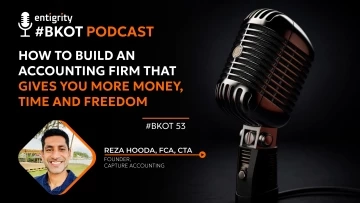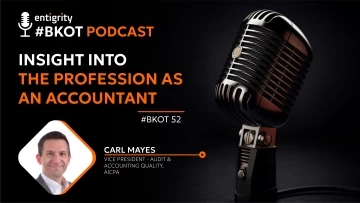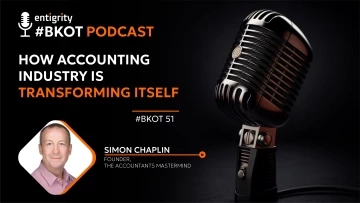This is the twelfth episode of our series BKOT: Build a KickAss Offshore Team. The title of the video, as it suggests, Digital Assets, Block Chain and Crypto Currency which explains its affects in payment, how the transactional behaviour is changing with time. Listen to the whole podcast to know more.
#BKOT 12: BUILD A KICKASS OFFSHORE TEAM
DIGITAL ASSETS, BLOCK CHAIN & CRYPTOCURRENCY
Hosted by: Chris Rivera, Director Client relations, Entigrity Offshore Staffing
Guest: Joey Ryan, CPA
Chris: Hello everybody again I know we just spoke about an hour ago but I am back with you all again. I am Chris Rivera, Director Client Relations with Entigrity appreciate you taking some time to join us, wherever you are hope you're safe and sound again I'm in New York city and and looking forward to a little bit of a break during this year-long tax season coming up this weekend and so I want to introduce my guest I have with me Joey Ryan, CFO Gilded and today you know we're going to be talking about Digital Assets, Blockchain and Cryptocurrency so we'll kind of break down the basics and then help educate and how this all works and hopefully you enjoy it, but first you know let's introduce Joey. Joey tell us a little bit about yourself I know you're out in New Orleans and yeah take it away.
Joey: Yeah thanks Chris happy to be here and thanks everyone for joining and checking out the episode today so yeah so I am a CPA accountant you know hopefully one of one of many here listening, I worked in public accounting so I feel everyone's paying out there I've been there with you guys I've been in the trenches I've done done the work so been in you all shoes I worked I worked as a financial statement auditor for 10 years worked at EY worked at RSM you know some of the larger firms out there and got a really good you know vast variety of kind of industry experience through there but really what how I got started getting into Crypto and Blockchain was during 2017 when kind of everybody and their mom was you know buying bitcoin on coinbase and just kind of riding it and seeing what happens kind of when the initial you know hype cycle started but I really got into it not just from kind of the bitcoin angle but more of the accounting angle this was when like the journal of accountancy the AICPA was putting out all of those kind of their weekly newsletters were all about blockchain and crypto and how this is going to really impact accounting and really you know kind of flip accounting on its head the accounting industry on its head and you know really change the the accounting landscape going forward so I was like alright what's this about like how you know if our jobs are going to change I should probably learn about what this like internet money stuff is you know so I kind of went down the rabbit hole from that angle and that's when I really discovered kind of the power of blockchain and crypto and really how that's the future of finance and transaction and kind of transactional rails, payment rails and accounting going forward so oncevI really understood that and the understood the implications that it actually is going to have on accounting going forward that's when I was like well I really need to get involved in this industry like asap kind of from the ground up so I met my other co-founders of gilded here in New Orleans actually at the ethereum meetup that we had running here in New Orleans, so we had the idea the initial idea of crypto invoicing, crypto payments combined with kind of the tracking and accounting aspects that was kind of our loose if you want to call it like v0.01 of what we were basically our idea what we were trying to build and we were fortunate enough to where we got into a the techstars accelerator blockchain accelerator program in New York city last year 2019 so we spent three months up there really honing in on customer discover products kind of the space the crypto accounting space, crypto payment space at that time and this was when kind of D5 was still early stable coins were still early like people some people were like stable coin believers back then but a lot of people were skeptics and then you know a couple months i'd say six months into 2019 is when stable coins really started taking off and that kind of started laying the framework a little more clearly for what we are building today and what we actually have today at gilded is we are the business infrastructure and layer for businesses to be able to transact utilizing digital currency cryptocurrency so right now today there's no business applications out there where if you're a business trying to transact in crypto utilize the advantages of digital currency for payment the speed transparency and and low cost as you're sending payments to remote teams, if you have remote payroll you know vendors across the world as you're kind of you know global business now right operating globally, if you want to utilize the kind of digital currency payment rails again to take advantage versus the older traditional payment rails and not pay your $40 hour not pay all your fx fees utilizing digital currency we make that super easy for business to be able to implement that into their existing kind of operating structures.
Chris: Love it wow yeah it's an incredible value that you you provide so with gilded and but let's take a step back and sometimes the clients that we work with they're just kind of starting their practice or you know have a night or inheriting a practice and they might not be too familiar with it we hear about it a lot I mean it's only a decade old at this point right so blockchain right that's kind of like the foundation so can you give it to us in like an account for dummies kind of kind of aspect of it just for blockchain.
Joey: Yeah so what do I tell my all my accountant friends is that blockchain is one giant open general ledger that anybody can participate in and transactions that occur or transferring a value whatever you want to call it an in and out right a transaction transfer of value, anything that occurs on the blockchain is immutable it cannot be reversed it cannot be like hacked into can't be changed etc so a good way to think of it is like a giant for like us are there's accountants that are familiar with like internal control structures etc think of it as like a black box of transactions that can't be changed black box and if you have the proper controls of the transactions going in right going into the transaction to the black box so like payroll processing right same thing if you have the controls over transactions going into the blockchain to verify that you have good data going in so you have like a turn, like somebody that has access to a wallet to send bitcoin to vendor xyz you know they're not doing it fraudulently etc, if you have the proper organizational and business controls and internal controls over that kind of structure like payment structure similar to any AP system right to verify that okay this transaction was properly executed or was input into the system properly then once it's executed through the blockchain you can, you know that the blockchain is processing that transaction correctly and the data coming out of it to basically process it and verify it is correct so if you have the controls going into it and then the controls coming out of it meaning you have the proper bookkeeping controls in place to record that transaction into your accounting system within the correct classifications then you can run the system properly but it's like any other type of payment process right you have to do kind of the same thing you know for wires ACH checks etc you need to have proper controls as a business so if you have those controls in place the blockchain's the same thing what the blockchain provides in value for anybody trying to use it for payments is that you can send millions and millions of dollars to anybody across the world instantaneously there's no there's no middleman so the blockchain takes away control of the middleman and it becomes a transaction between the sender and the receiver, so there's no clearing house the blockchain is the clearing house right so by taking away the middleman you're taking away those those large fees so the fee you can send a million dollars to somebody in india you know to a software developer in india for pennies on the dollar which is huge right you're not sending wire fees you're not there's no fx fees that's that's huge so that's one speed it occurs almost instantaneously the blocks get mined which is by mind it basically means process same thing as process clearing etcetera just think of mining when everybody talks about mining it's being processed so if the blocks get mined and processed onto the blockchain every each blockchain is different but bitcoin transactions can clear in 30 minutes ethereum depends etcetera but pretty instantaneously you're talking about 30 minutes, 20 minutes, 5 minutes whatever around there depending on how fast or slow the network is whereas obviously sending something internationally can take days and may not even clear you can have issues with the bank etc you have three different banks taking a piece of the pie a lot going on, so speed low cost and then transparency you can actually view your transaction being confirmed on the blockchain real time so you have transparency into the payment being sent being processed whereas obviously with the bank you have no idea you're talking to some guy that's waiting yeah that's trying to figure it out so those three benefits are huge for businesses that deal internationally either with a remote team or you know paying vendors paying customers internet or receiving money from customers international.
Chris: Love it! well said yeah and the being able to control the money themselves is very important I mean you don't have to rely on a company like you said a bank government fees other controls right that were that we're currently in so it's refreshing to see how you have the ability one to to see it happening step by step but also the security aspect of it right it's the security this is far and beyond just the most secure out there and can you talk about why is that and how is that?
Joey: Yeah so to not try to get too technical because I am not a software developer I just know it from the accountant finance angle so the blockchain is basically a network of distributed nodes node equals computer so think basically thousands and thousands of computers as blocks our mind basically that code gets copied to all of those thousands of computers and it's that exact same code so thousands and thousands of different computers for each blockchain or depending upon who's participating in the blockchain basically have carbon copies of a blockchain you can spin up it's called spinning up a node or you can run it run a blockchain download the whole entire history of a blockchain on your computer and like become a node itself to like validate that transactions are occurring so but by doing that it takes away kind of the honey pot of a centralized system right, so if a company has an internally centralized system it gets attacked you know all you have to have is one attacker that comes in they get access in and all of a sudden they can change any transactions completely screw everything up and you're screwed right but with a decentralized network when you have thousands and thousands of copies of transactions right a hacker can't go into one if they change one all these other computers know that that one is wrong, so the only way that you know people say like oh can't like blockchains be hacked like all these hacks that you hear about you hear about bitcoin like that's just like literally clickbait headlines bitcoin hacks is not like a thing like the only way a blockchain can be quote unquote hacked if you look at blockchain as a system is somebody has to have control of 51% of all of the computers out there if somebody controls 51% then they can right then they can theoretically control the transactions that occur after that but when you're talking about how big a lot of these public blockchains are and there's difference between public and private blockchains but we're just talking public blockchains right with so many validated decentralized computers a 51% hack is like super let's just say it's super hard to achieve right now.
Chris: Yeah! that makes sense it makes sense especially if you just have you get into you know one building to break into the bank it's simple but if you had to break into that building and then you there were thousand other buildings right outside their buildings it's gonna take a while to get through all that and by then someone's gonna catch on so awesome. Well said so then let's talk a little bit about the cryptocurrency so there are a lot out there and you mentioned bitcoin are there some in development stages could you just talk about that.
Joey: Yeah so like yeah absolutely so you know on a basic level a cryptocurrency is just the way to transfer value across these blockchains right so to start having transactions across blockchains and that was the initial if you read the bitcoin white paper from 2009 forgot it was started but well the original bitcoin white paper started by Satoshi Nakamoto his idea was having a free open system that anybody can participate in to transfer value freely across the network and eliminate a it eliminates the double spend problem so you can't I can't have like one bitcoin and send that same bitcoin like just say it's like serial number one I can't say that to you Chris I can't send that same one to like five different people like you know fraudulently you know basically creating the same one and sending in five right eliminates that and it again secures the transaction so by having that peer-to-peer system that's that was the original kind of creation on that so the cryptocurrencies are again just the way to transfer value across those networks initially so by now there are a ton of different cryptocurrencies out there and this gets into like this whole D5 movement that's starting now where people have on the ethereum blockchain basically figured out how they can create value and offer basically if you want to call it like decentralized give my I'll stake or give my five bitcoin to this protocol whether it's a centralized exchange or some decentralized uh smart contract I'm starting to get into the weeds here probably these people but let's just say you take that five bitcoin and you're basically lending it like it's a bank right you're depositing it and then either through a centralized unit or decentralized protocol that's already code written into the contract they lend it out and they're able to give you interest rates on your your bitcoin that you basically give them when i say give that's the i'm not going to get into whether you are actually giving it or you're still holding in your wallet etc that's different conversation but, you can get interest up to 8 - 10% some different places so that's huge right like I mean today you hold your cash in your checking account at chase or Bank of America whatever during like nothing right literally no so these protocols literally you can earn interest on your bitcoin you can earn interest on your ethereum and as the value of those tokens go up you're obviously earning more interest because the interest based on the value the price of the token at that at like a specific point time so that's just one instance there's a lot going on in the space where you're yeah can lock up different things but let's just say that right now the kind of banking financial products that are coming out in the space are super super interesting and I think it's only going to get bigger and it's attracting more and more people obviously because of the interest generated from these tokens etc and where this thing can go so there's a lot going on in that space but for simple purposes sending and receiving crypto can be utilized for any firm any business and you can you know you're gonna have you're gonna start having clients as we have accounting firms that are listening here you're gonna start having clients that are either gonna start transacting in crypto running crypto etc and you need to understand the ramifications of of each, so in a nutshell for tax purposes crypto in the United States is taxed as property so think of like you can just relate that to like basically think of like paying or receiving like stock you have to calculate cost basis and track or calculate a gain or loss each time you send or receive one of those transactions so for accounting purposes what accounts need to start to understand is how do you track cost basis how do you record gain loss you know is it short term long term those tracking purposes for tax purposes for gaap purposes it's recorded as an intangible asset a whole set of rules that are different but in tangible assets, so we we have a toolkit for accountants that's one of the things that uh at gilded we do is we help businesses be able to track and account for digital assets meaning crypto and sync those transactions into your existing accounting system so we help like automate that process for businesses or for accountants that are doing bookkeeping for businesses or anything of that source and we have a resource page an accountant toolkit to help kind of like you know 101 like What is crypto? How do we start tracking this? What do I need to know as an accountant? because I know a lot of people maybe a lot of people have seen this are like oh I've heard about blockchain and crypto for like five years like when's it coming like I don't care until you know like right like a lot of that yeah until and I get it like again I've been in there and I understand that until your clients start coming to you like actually with crypto on their books you don't care because it does enough right you're so focused on gotta get this a lot done gotta get this tax done moving on moving on moving on but I'm trying to help accountants realize that this is coming like it's coming it's the matter of when not if and it's coming a lot faster than people realize, the government actually two things the government did or two regular regulatory things regulatory things that just popped up one the OCC just a few weeks ago said that banks can now actually custody crypto so that's huge any FDIC covered bank can now start cursing cryptos so they're going to start costing crypto offering these crypto products etcetera you're going to see that coming rapidly and two a lot of people don't realize that in the first stimulus bill that government was going to when the government for the carers act when the government gave everybody their $1200 checks they were actually going to in the first draft of that bill they actually were going to send everybody $1200 via digital currency they were going to give everybody a basically a wallet address and send everybody $200 to your digital currency because that's the quickest and easiest way to get it. Now obviously that didn't get passed but the fact that they put that in there really shows how far forward looking or close yeah how close the government is to really like making this mainstream creating digital dollars moving from this analog system to digital, so it's coming a lot quicker than people realize and as accountants this is a great opportunity for a new revenue stream for your accounting firm if you already have a good knowledge or a good working knowledge of how crypto works how to account for it for gaap purposes how to account fo it for tax purposes and you start having clients that are coming to you with these questions you're already a step ahead of the game you're going to bring in new clients that are going to have these issues and you're going to be able to start solving these issues start creating again almost like a new revenue stream it could be a new advisory stream where you're revising the market.
Chris: So marketing that right now they're hesitant it's just waiting for them to come they're just waiting and then like all right I'll get back to you once I study this right but right you know get ahead of the game you know be that be the expert the tools are out there the resources are out there and you can be remote right your team's remote.
Joey: Yeah we're remote and that's that's a big part of it right so we're a team that's fully remote we have individuals or team members here in the United States we have team members over in Europe so we're fully remote and you can do this you know remote is the way the way to go right you know you can obviously with the coronavirus that pushed everybody you know forward five years to this kind of fully remote environment that were operating in and you know there's huge benefits right cost savings, meetings that you can take with anybody across the world and that that applies with digital currency as well right like everybody's moving digital sending payments to people across the world we're globally connected we've been globally connected but now we're now globally connected now more than ever so by having that globally connected transfer of value you know being able to pay teams remotely being able to pay vendors remotely doing that seamlessly easily that's the future.
Chris: Yeah and you so you're remote and you're obviously Europe you know India you have some offshore staff as well and how's that experience then it's just been a seamless integration into your company right.
Joey: Yeah exactly it's you know as a startup, it's super easy to you know utilize the communication methods we have today the slacks, the messengers teams whatever it is everybody you know coordinates through you know UTC time etc and by utilizing kind of global workforce you're able to tap into a higher power of people right now you're not just now you're not just saying hey I need a software developer and they have to be in New Orleans or New York or wherever right, now you're actually getting a higher talent pool because you're global it's like I need a software developer from anywhere in the world all of a sudden your talent pool just got huge so global remote work not only provides less cost on infrastructure less cost on the back end but obviously gives you access to a much greater and much better talent pool to where you can really move your business forward.
Chris: Yeah there's a lot of clients that I work with that are in the smaller rural areas or they just can't find local talent or they can't find an experience enough local talent and you're absolutely right you know it's this pandemic has opened up the eyes that it's just simply not an american workforce the global workforce and there's just so much talent out there and as long as they're dependable skilled and able to you just work with you on you know being personable it's just like hiring anybody locally or in your office there's no difference and so I'm glad you said that and and so it winding down now in a few more minutes you I learned a lot today so I hope our audience learned a lot so we appreciate that and guilded is a great resource for this. Any other final thoughts or anything else you want to say.
Joey: If you guys have questions please reach out to me twitter Joey T Ryan; linkedin at Joey T Ryan you can check us out at gilded.finance is our website twitter gilded actually finance if you have any questions don't hesitate to reach out to me I'm happy to help all accountants kind of start getting used to start educating them you guys on what's coming where we're at where we're going and really help you guys kind of build that knowledge base to you know push a new kind of revenue stream forward and stay on top of kind of the new happening.
Chris: So exactly spot on well awesome yeah this was Episode 11 of our #BKOT how to build a kick-ass offshore team I hope everyone really enjoyed Joey's presence today and speaking about this and yeah i mean obviously he knows what he's talking about so if you need to get more details please reach out to him um and then just the the idea too of building a kick-ass offshore team remote aspect offshore aspect of it having access to this talent you know Entigrity has the resources in place for the staff to help you out so learn from Joey and then get the staff through Entigrity and then did your firm disguise the limit right, so again Joey thank you for joining so much absolutely in the future and that's it folks so we're gonna sign off enjoy the weekend enjoy the holiday and be safe and peace out.

_1642676318-1686039629.webp)



